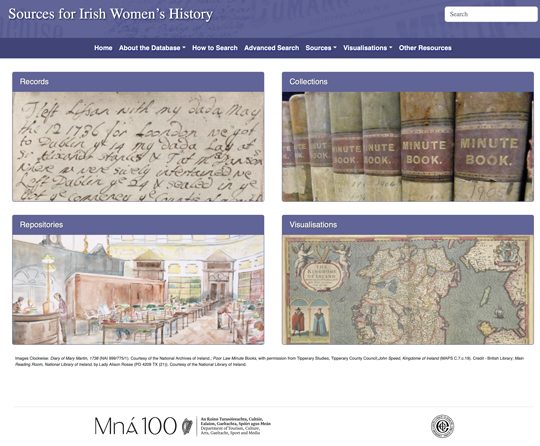SOURCES FOR IRISH WOMEN’S HISTORY
Published in Issue 3 (May/June 2023), News, Volume 31By Maria Luddy
The original ‘Directory of Sources for Irish Women’s History’ was made available on CD-ROM in 1999. With the advances in technology, the CD has now become obsolete and can no longer be read on more recent computers. In mid-2022 we asked the Irish Manuscripts Commission and the Mná 100 unit of the Department of Tourism, Culture, Arts, Gaeltacht, Sport and Media to support transferring the contents of the CD to a website which would be freely and publicly available. Their support has made the creation of the website possible and has allowed us to update much of the information contained in the original ‘Directory of Sources’.
The aim of the update is to enable the database to be searched by topic, archival institution, region, date and keywords. We wanted to ensure that the addresses and contact details of repositories were accurate, and a number did need updating. We have added links to other significant and useful digitised resources, such as the Dublin Metropolitan Police Arrest Books available through the University College Dublin digital resources site. It is also possible to visualise connections among records on any particular subject in a range of repositories.
Over the last twenty years there has been an enormous advance in technology that allows researchers greater access to archival material. A number of the national repositories, such as the National Library of Ireland, have digitised many of their catalogues, which is a great boon to researchers. Some repositories have digitised collections of documents, allowing researchers to access material from anywhere in the world. For instance, the National Archives of Ireland have placed the Irish 1901 and 1911 censuses on-line. Similarly, the Military Archives have digitised thousands of pages from the Bureau of Military History, which has deepened and broadened research into the period 1913–23. In other repositories a number of private or family papers have also been digitised since 2000, such as the correspondence of Edith Somerville and Ethel Smyth, available on-line through the Special Collections Library in Queen’s University, Belfast. The Resource List provided on the new website contains further information and links to many repositories that have digitised a whole range of additional sources that can be investigated for the study of Irish women’s history.
Over the past twenty years several of the archives listed here have developed websites, but most repositories still rely on general and brief descriptions of their collections. This website provides more detailed information on potential sources for the history of women, information that could otherwise only be gleaned from physically visiting the archive. When local or national archives have listed material in their custody on-line, they do not always direct attention to their value for women’s history. Part of the function of this website is to do so. The focus for many archival institutions and libraries in recent years has been on the ‘decade of centenaries’, 1912–23, but on-line manuscript resources relating to women for the period before 1900 are still relatively rare. We have added new material from the pre-1900 period to this website.
The website also provides useful guidance for researchers of collections that have been listed in detail since the original Directory was created. For instance, the Directory noted the existence of Kathleen Clarke’s letters in the Daly Papers Collection at Limerick University Archives. This collection has now been catalogued but the information contained in the ‘Sources’ website relating to these papers is still valuable. It can be searched by keyword, and a search for women in politics will bring up not just the Daly Papers but also other relevant archives. In other words, this website enables users to identify the existence of multiple collections on similar themes or individuals.
The website remains the only detailed all-island listing of archival-based documents relating to the history of women in Ireland. It has not been superseded by any on-line or hard-copy catalogue of sources; web-based guides to sources for women’s history on an all-Ireland basis do not exist. The range of material listed demonstrates that all archival repositories have documents of relevance for women’s history even if they were not recognised as such.
The updated website now contains 20,790 records and details 2,413 collections from 221 repositories around the country. It can be found at https://www.irishmanuscripts.ie/womenshistorysources/index.php.
Maria Luddy is Emeritus Professor of Modern Irish History at the University of Warwick.

















